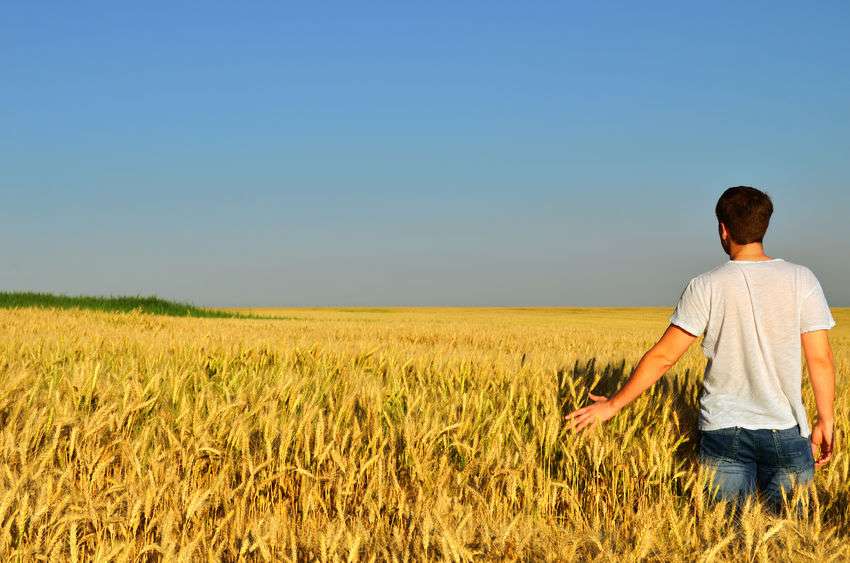By: Benjamin Forbes*
 If you are a farmer, your time is best spent overseeing the operations of the farm and handling tasks that require your unique expertise rather than doing the unskilled manual labor. This labor can, and likely should, be delegated to employees. Often times those employees are under the age of 18, and thus considered minors by State and Federal Law.
If you are a farmer, your time is best spent overseeing the operations of the farm and handling tasks that require your unique expertise rather than doing the unskilled manual labor. This labor can, and likely should, be delegated to employees. Often times those employees are under the age of 18, and thus considered minors by State and Federal Law.
There are two bodies of law that Pennsylvania employers must be aware of if they intend to employ minors: The Pennsylvania Child Labor Law (CLL) and The Fair Labor Standards Act (FLSA).
This post is meant to serve as a resource for farmers who are considering hiring minors to work on the farm.
How do I know if my agricultural employees are covered by the FLSA?
Agricultural employees are covered by the FLSA if the annual gross volume of your farm’s sales equals or exceeds $500,000, and if any of your employees handle or participate in the production of goods for commerce. This includes employees who cultivate goods, help raise livestock, poultry or bees, perform any activities incident to the operation of the farm, transport goods produced, or sell goods produced. Essentially because this definition is so broad, if your annual gross sales exceed $500,000, your employees are covered by the FLSA.
Minor employees are covered under the FLSA if they are involved in the production, transport, or sale of goods that will travel in interstate commerce. “Interstate commerce” refers to goods crossing state lines.
What information must be kept on file related to minor agricultural employees?
Employers must keep an employee file that includes their name, date of birth, and the minor’s permanent address while employed. If the minor-employee is under the age of 14, then the written consent of the employee’s parent or guardian must also be kept on file.
Tax-related and other regulations may require additional documentation of employment.
Do minors working on farms need a worker’s permit?
Minors working on a farm are not required to obtain a worker’s permit under the CLL or the FLSA. However, employers must keep an employee file that includes their name, date of birth, and the minor’s permanent address while employed. If the minor-employee is under the age of 14, then the written consent of the employee’s parent or guardian must also be kept on file.
Tax-related laws and other regulations may require additional documentation of employment.
What rules govern minimum wages for minors working on farms?
The CLL exempts minors working on farms from the $7.25 Pennsylvania minimum wage requirement.
The FLSA allows an employer to pay a minor who is working on a farm a wage as low as $4.25 an hour for the first 90 consecutive days of their employment. That said, it may be difficult to draw even minor employees for such a low wage. If part of your business is local, low wages can harm your farms reputation and ultimately hurt your business. It is up to you as a business owner to decide what is best for your business in light your reputation and finances. After the first 90 days, you must pay them at least $7.25 and hour if your farm is covered by the FLSA. $7.25 is the federal minimum wage.
When can underage agricultural employees work?
The CLL has an exception to its hour and wage rules for minors that defers to the FLSA. The FLSA governs when minors can work on a farm. The FLSA contains different rules for children and different age groups and for children whose parents own the farm on which they work. We will address the different categories of minor farm employees in turn.
A. Individuals of all Ages Whose Parents Own the Farm
Minors of all ages may work at any time if their parents own the farm. Simply put, if you own a farm, your children are not subject to any of the FLSA’s limits on when they can work. However, it is important to keep in mind that your children should not be missing school to work on the farm if the school does not consider farm work an “excused absence.” Information on excused absences can be found within the handbook/policies provided by your child’s school district. A parent must also observe PA’s compulsory school attendance law.
B. Minors Aged 16-17
Minors aged 16-17 may work on a farm at any time including school hours. Again, it is important to keep in mind the attendance policies of your employee’s school district. Most school districts will not excuse absences for work. Encouraging employees to miss school for work can harm an employer’s reputation and may also violate other state laws.
C. Minors Aged 14-15
Minors aged 14-15 may work any hours outside of school hours. However, minors aged 14-15 may not work during school hours. “School hours” are defined by the official calendar set by the school district in which the minor resides. It is important to make sure that you are aware of the school district in which your minor employee works, so you can schedule the employee based on their permissible non-school hours.
This requirement also applies to minors who are homeschooled or attend a private or parochial school. Additionally, the requirement applies to underage migrant workers. Underage migrant workers in this category may not work during the school hours of school district in which the farm resides.
D. Minors Aged 12-13
Minors aged 12-13 may work outside of school hours with the written consent of their parent or guardian. Employer’s must keep this written consent on file.
E. Minors Under the Age of 12
Minors under the age of 12 may work on a farm with the consent of their parents if the workers on the farm are exempt from federal minimum wage requirements. Farms who have used less than 500 man days in any quarter of the preceding calendar year are exempt from the federal minimum wage requirements. A “man day” is any day that the farmer utilized more than 1 hour of employee-agricultural labor.
F. What happens if I violate the laws governing when minor employees can work?
Minor-employees can be a valuable asset on a farm, but it is important to be aware of the federal guidelines regarding child agricultural labor. Failure to adhere to the guidelines can result in up to a $10,000 fine for the first offense and even imprisonment for subsequent offenses.
How Many hours a week can a minor work on a farm?
The CLL prohibits minors that are between the ages of 12 and 15 from working more than 18 hours a week during the school year and 40 hours a week during breaks. Minors that are 16 or 17 years old may not work more than 28 hours a week during the school year and 48 hours a week during breaks. No minor may work more than 6 consecutive days. Employers should get a copy of the normal school calendar from the school district of each farm employee.
Pennsylvania has also set restrictions on when a minor can work based on their school schedule and age. Employers must conform their minor employee’s schedules to these requirements or they will face fines from the Pennsylvania Department of Labor. The FLSA does not set hour requirements for minors working on a farm.
What farm tasks cannot be performed by a minor?
The CLL does not list specific tasks that minors cannot perform on a farm. However, the CLL does prohibit a minor from participating in any of the tasks that the United States Department of Labor designates to be hazardous to children. Minors under 16 who work on a farm are prohibited from operating certain equipment, handling chemicals or explosives, and working in certain situations with large animals. Be sure to review the complete list of these tasks here: https://www.dol.gov/whd/regs/compliance/whdfs40.htm.
Minor-employees can be a valuable asset on a farm, but it is important to be aware of the state and federal guidelines regarding child agricultural labor. Failure to adhere to the guidelines can result in up to a $10,000 fine for the first offense and even imprisonment for subsequent offenses.
——–
*This post was checked for currency on October 7, 2018 and reproduced with permission by author Ben Forbes. Original posts, which have been combined herein, can be found here.
 Ben Forbes, at the time of this post, is a third year law student from Penn State’s Dickinson Law. He is from Orwigsburg, Pennsylvania and a graduate of Kutztown University of Pennsylvania. He hopes to join a general practice firm in Pennsylvania after graduation and ultimately advise small businesses.
Ben Forbes, at the time of this post, is a third year law student from Penn State’s Dickinson Law. He is from Orwigsburg, Pennsylvania and a graduate of Kutztown University of Pennsylvania. He hopes to join a general practice firm in Pennsylvania after graduation and ultimately advise small businesses.
Sources:
Pennsylvania Child Labor Law information:
Information on Fair Labor and Standards Act:
https://advance.lexis.com/document/?pdmfid=1000516&crid=2d2acaeb-92f7-4fbf-9d89-5c01229cd3d6&pd
https://www.dol.gov/general/topic/youthlabor/agriculturalemployment
Click to access childlabor102.pdf
Dept. of Labor quick reference guide to minors in Agriculture: https://www.dol.gov/whd/regs/compliance/childlabor102.pdf
